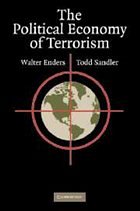Nicht lieferbar

The Political Economy of Terrorism
Versandkostenfrei!
Nicht lieferbar
Weitere Ausgaben:
Short description/annotationThis book analyzes the political, economic, strategic and historical dimensions of terrorism.Main descriptionThe Political Economy of Terrorism presents a widely accessible approach to the study of terrorism that combines economic methods with political analysis and realities. It applies economic methodology - theoretical and empirical - with political analysis to the study of domestic and transnational terrorism. Included in the treatment are historical aspects of the phenomenon, a discussion of watershed events, the rise of modern-day terrorism, examination of cur...
Short description/annotation
This book analyzes the political, economic, strategic and historical dimensions of terrorism.
Main description
The Political Economy of Terrorism presents a widely accessible approach to the study of terrorism that combines economic methods with political analysis and realities. It applies economic methodology - theoretical and empirical - with political analysis to the study of domestic and transnational terrorism. Included in the treatment are historical aspects of the phenomenon, a discussion of watershed events, the rise of modern-day terrorism, examination of current trends, the dilemma of liberal democracies, evaluation of counterterrorism, and analysis of hostage incidents. Rational-actor models of terrorist and government behavior and game-theoretic analysis are presented for readers with no prior theoretical training. Where relevant, the authors display graphs using the data set International Terrorism: Attributes of Terrorist Events (ITERATE), and other data sets.
Table of contents:
1. Terrorism: an introduction; 2. The dilemma of liberal democracies; 3. Statistical studies and terrorist behavior; 4. Counterterrorism; 5. Transference; 6. International cooperation: dilemma and inhibitors; 7. Hostage taking; 8. After 9/11; 9. Economic impact of transnational terrorism; 10. Homeland security; 11. The future of terrorism.
This book analyzes the political, economic, strategic and historical dimensions of terrorism.
Main description
The Political Economy of Terrorism presents a widely accessible approach to the study of terrorism that combines economic methods with political analysis and realities. It applies economic methodology - theoretical and empirical - with political analysis to the study of domestic and transnational terrorism. Included in the treatment are historical aspects of the phenomenon, a discussion of watershed events, the rise of modern-day terrorism, examination of current trends, the dilemma of liberal democracies, evaluation of counterterrorism, and analysis of hostage incidents. Rational-actor models of terrorist and government behavior and game-theoretic analysis are presented for readers with no prior theoretical training. Where relevant, the authors display graphs using the data set International Terrorism: Attributes of Terrorist Events (ITERATE), and other data sets.
Table of contents:
1. Terrorism: an introduction; 2. The dilemma of liberal democracies; 3. Statistical studies and terrorist behavior; 4. Counterterrorism; 5. Transference; 6. International cooperation: dilemma and inhibitors; 7. Hostage taking; 8. After 9/11; 9. Economic impact of transnational terrorism; 10. Homeland security; 11. The future of terrorism.




